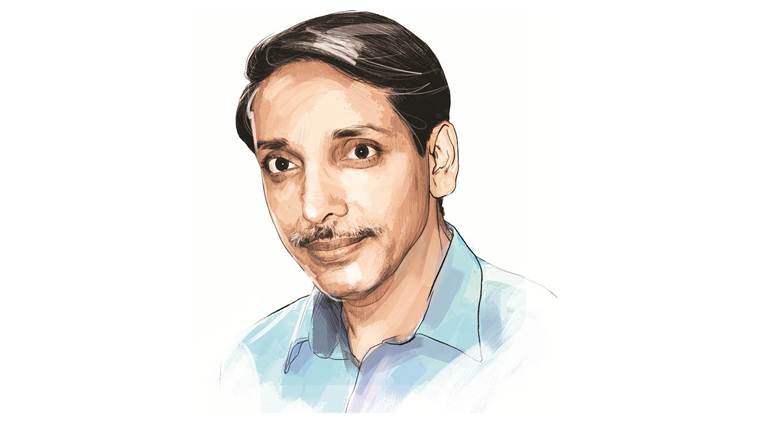- India
- International
Mamidala Jagadesh Kumar: The professor & the Vice-Chancellor
An excellent teacher, or a bad administrator? A robotic stickler for rules, or a man with no respect for them? A square peg in a round hole, or a humble misfit everywhere? The Indian Express finds out what makes Vice-Chancellor M Jagadesh Kumar the face of the JNU unrest
 M Jagadesh Kumar is the much-reviled figure at the centre of the Jawaharlal Nehru University unrest, with calls growing for his resignation as Vice-Chancellor.
M Jagadesh Kumar is the much-reviled figure at the centre of the Jawaharlal Nehru University unrest, with calls growing for his resignation as Vice-Chancellor.
On October 24, 2002, IIT Delhi hit the headlines for an unusual reason. About 400 students of Nilgiri Hostel boycotted the mess as a mark of protest against their warden, Mamidala Jagadesh Kumar. “At IITs, students have a lot on their plate, and there’s no student politics. The Nilgiri protest was a rare moment in IIT Delhi’s history,” says a former textile engineering student of the institute, who was a part of that agitation.
The immediate trigger was Kumar, the warden since 2000, slapping a hostel resident for using profanity in a conversation with a friend (Kumar had overheard the conversation). “The mess boycott resulted from a build-up of frustration among Nilgiri residents because of a series of steps he had taken,” the former student adds, listing penalties he introduced for late payment of mess and hostel fees, as well as wrong parking.
Another former student, a computer science engineering graduate who was Nilgiri hostel secretary during the period, adds, “He treated us like 10-12-year-olds.”
The boycott eventually lasted three days till IIT Delhi Director R S Sirohi called on Nilgiri students and requested them to end their protest and an inquiry was set up into the matter, confirms Professor, Department of Textile Technology, S M Ishtiaque. He was the associate dean of students’ welfare at the time. “After the inquiry, he (Kumar) was asked to step down as warden. The student who used profanity was also punished.”
That was 2003. More than 16 years later, just across the road from IIT Delhi, M Jagadesh Kumar is the much-reviled figure at the centre of the Jawaharlal Nehru University unrest, with calls growing for his resignation as Vice-Chancellor. His four-year tenure as JNU V-C has been marked by almost constant protests, and allegations by a large chunk of teachers and students of not following the university’s rules on everything from appointments to conduct of meetings.

For many, the IIT Delhi incident sums up the failings of Kumar as an administrator, even as he is universally hailed as an excellent teacher of electrical engineering, with one of his fields of expertise being nanoelectronic devices. Before becoming warden, Kumar had held only one other post — Chairman, Mess Staff Welfare Cell (September 2002-September 2003) — involving direct and regular interaction with students.
The Sunday Express reached out to Kumar requesting an interview for the profile, but did not hear from him.
Despite serving as JNU V-C since January 2016, Kumar hasn’t stopped teaching at IIT Delhi. “You can judge his dedication for teaching by the fact that he doesn’t take any remuneration for the classes here,” says a colleague in the Department of Electrical Engineering.
Nadeem Beigh, a 27-year-old PhD student at IIT Delhi who was taught by Kumar last semester, says he reaches half-an-hour before his lectures at 8 am. “He comes in at 7.30 am sharp to set up his projector. He is the one who turns on the AC in summers and the heater in winters well before the students come in,” says Beigh. “His classes are among the most sought after by the students of electrical engineering… Honestly, the person we read about in the newspapers and who we see in our classroom are not the same.”
But even in the precision with which Kumar runs his classes at IIT Delhi could lie clues to why he may be a wrong fit for JNU, which has a history of teachers and students being almost friends, classes spilling out into the open, and students even being allowed to eat during lectures.
In Kumar’s clockwork planning, his hour-long class involves teaching for 50 minutes — when an alarm goes off to mark the time — followed by a 10-minute presentation by a student.
Kumar’s colleagues also vouch for his honesty and simplicity. Till he was made JNU V-C, he would cycle everywhere within the IIT campus. “I don’t think he even owns a car,” says an IIT-Delhi professor who does not wish to be identified. The teacher adds that Kumar can’t tolerate use of profanity, perhaps explaining that IIT Delhi flare-up.
Even officials at the HRD Ministry — which, as reported by The Indian Express, have been exasperated at his handling of JNU lately and even called for his resignation in November — concede this side of his. Says a former ministry officer, refusing to be identified, “As a person, there’s not much you can fault him on. Kumar is disciplined, decent, law-abiding and humble.”
However, as the officer goes on to add, “Like an engineer, he is linear, methodical and logical. The problem is that (as JNU V-C) he is a square peg in a round hole.”
Incidentally, the HRD Ministry’s note to then president Pranab Mukherjee in 2016 on appointment of a new V-C for JNU had a veiled warning that Kumar could be a misfit. It stated, “Of the panel of four candidates, Prof Mamidala Jagadesh Kumar is Professor of Electrical Engineering at IIT Delhi. The IIT system differs fundamentally from that of a university, including in the culture, structure and functioning.”
Then HRD Minister Smriti Irani had “strongly recommended” scientist V S Chauhan as he had “considerable academic and administrative experience of the university system, both in India and abroad”.
However, Mukherjee chose Kumar. Sources close to the former President deny that Irani’s choice was ignored. Kumar’s name was mentioned first, followed by Chauhan’s, in the panel of four finalists with Rashtrapati Bhawan. “This indicates the order of preference. Hence, Kumar was appointed,” the source says.
Originally from Mamidala in Nalgonda district of Telangana, he holds a masters and PhD from IIT Madras and did post-doctoral research at the University of Waterloo in Canada.
Says the above officer, “JNU has an intellectual culture and has always been anti-establishment. Knowledge is generated, especially in social sciences, when you ask questions. There’s no such thing as an obedient, complying social scientist.”
On Kumar’s functioning, the officer adds, “He has an ideological framework and is trying to supplant a pre-drawn action plan, which is leading to confrontation. Change cannot be brought about in a pig-headed manner.”
JNU colleagues even describe his demeanour as “robotic” at times. A former member of JNU’s Executive and Academic Council, who was one of the most vocal supporters of Kumar earlier, says, “It started becoming apparent to us that he didn’t react to anything anyone said. He’s also a very poor communicator and it’s the worst thing for this university. In meetings of statutory bodies, when members would dissent, he would simply say, ‘dissent noted’, without listening and move on.”
Another former member of the Academic Council says, “Kumar really believes a decision means no discussion. We all have to agree with what he says.”
The suggestion that Kumar is close to the RSS and its affiliate Vijnana Bharti has been around for a while, with IIT Delhi teachers talking about this though off the record. There is no official acknowledgement of the same.
A Jayakumar, special advisor with Vijnana Bharti, told The Sunday Express that Kumar is neither a member nor has he ever held an office in the organisation. On January 20, 2016, right after his appointment to JNU, Kumar, while denying any association with Vijnana Bharti, had told this newspaper, “I think it is a good organisation doing good work. I attended its function in IIT Delhi last month.”
Ishtiaque gives examples such as Kumar trying to name the Nilgiri Hostel lawn after Swami Vivekananda as a sign that he leans right in his thinking. Kumar had even put up a plaque which he was later asked to remove, says Ishtiaque. “He is a good academician, meticulous, disciplined, hardworking and a gentleman. But he can also be a bit set in his ideas and sometimes inflexible.”
However, JNU School of International Studies Dean Aswini K Mohapatra, who’s also Chairperson of the Centre for West Asian Studies, says it is wrong to see Kumar only through one prism. Saying he only acts on “legally sound” grounds, Mohapatra adds, “Once a rule is made, it has to be applicable to all. He doesn’t discriminate… He’s someone who walks within the limits of the law.”
Admitting his interactions with Kumar have been mostly formal, Mohapatra puts his finger on another trait that may have come in the way of the V-C settling into his role. “It’s not that he’s not warm. I’ve never felt unwelcome by him,” he says, but obviously there is “some distance” since he is not from JNU and from a science background.
JNU Professor Vibha Tandon, who headed the panel formed by Kumar to hear appeals of students Kanhaiya Kumar, Umar Khalid and Anirban Bhattacharya against a High Level Enquiry Committee finding against them, also asserts that the V-C stands on law’s side.
Contrary to popular perception, she adds, he “never interfered” in her work. “In any of my official capacities, he has never tried to brief me. Many times, he hasn’t even asked what I’m doing,” says Tandon. She now heads the Internal Affairs Committee to hear sexual harassment cases, and the panel itself has been caught in several rows.
Tandon also praises him for being well-prepared for meetings, not sitting on decisions, and being extremely humble. “He has no ego issues. It’s happened that we sit on chairs and he sits on the carpet… I have never heard him use bad words against opponents… even people abusing him in meetings.”
However, according to some, one reason why sexual harassment allegations are seen to have been mishandled under Kumar could be that the V-C appears “intimidated by women” and doesn’t have “the vocabulary to talk to them”.
Says a faculty member, I once went to his office to speak about something confidential and he called his secretary (a woman) in, saying it’s better for a woman to be there while he’s talking to one. And he barely ever makes eye contact.”
According to professors, this image of a shy, humble man may be cultivated, not gelling with how he seems to “court publicity”. Kumar’s Twitter timeline is full of links to interviews he has given to TV channels or websites.
But, ministry officials believe, his right tilt is why Kumar will last out the remaining year of his term, especially as the BJP has not hidden its intentions to breach the Left bastion in JNU. A senior minister had admitted last year that Kumar was stubborn and inflexible but the only one capable of helping them in this.
In an official note to the PMO last year, the HRD Ministry too admitted that the V-C was trying to “change the character of the university”, though adding that any such attempt should have been more calibrated. Officers point to JNU asking 12 Emeritus Professors, including former V-C Asis Datta and historian Romila Thapar, to send in their CVs for university to review their position as one example.
However, Beigh points out, even if Kumar is right-leaning, it doesn’t reflect in his classes. “I am a Kashmiri Muslim, and honestly, I expected him to be biased towards me. But he is so encouraging in the classroom.”
Must Read
Apr 19: Latest News
- 01
- 02
- 03
- 04
- 05







































